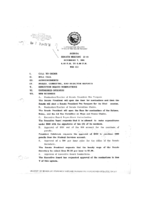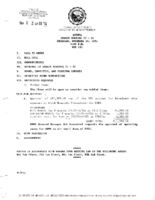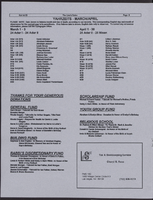Search the Special Collections and Archives Portal
Search Results

University of Nevada, Las Vegas (UNLV) 41st commencement program
Date
Archival Collection
Description
Commencement program from University of Nevada, Las Vegas Commencement Programs and Graduation Lists (UA-00115).
Text

Transcript of interview with George Pollak by Claytee White, May 25, 2010
Date
Archival Collection
Description
George was raised in Mattapan, a suburb of Boston, by his mother and father. George had four siblings and was the second youngest. George shares fond memories of growing up and playing softball and tennis in the neighborhood park with his numerous friends. George could listen to a song on the radio and play it on the piano by ear when he was as young as four years old. George had several jobs to earn money growing up, including working in a record store and as a busboy. Eventually George and his brother joined a trio with Steve Harrington and performed in clubs. In 1958, George joined his brother and Paulette Richards in Las Vegas where they had a contract to play at El Rancho Hotel & Casino where they played until it was destroyed by fire. Following the fire, George and his brother parted ways and each did their own thing. In the 1960s, George began playing with the band at Caesars Palace. George used his background in accounting to do some bookkeeping and payroll for some of the ban
Text
Jamie Ross (PACT Coalition for Safe and Drug-free Community) oral history interview conducted by Kelliann Beavers and Elia Del Carmen Solano-Patricio: transcript
Date
Archival Collection
Description
From the Lincy Institute "Perspectives from the COVID-19 Pandemic" Oral History Project (MS-01178) -- Community organization interviews file.
Text

Meeting minutes for Consolidated Student Senate University of Nevada, Las Vegas, November 7, 1991
Date
Archival Collection
Description
Text

Meeting minutes for Consolidated Student Senate University of Nevada, Las Vegas, November 14, 1991
Date
Archival Collection
Description
Text

José Luis Meléndrez oral history interview: transcript
Date
Archival Collection
Description
Oral history interview with José Luis Meléndrez conducted by Laurents Bañuelos-Benitez on November 20, 2018 for the Latinx Voices of Southern Nevada Oral History Project. In this interview, Meléndrez discusses his family background and early life in Baja California. He talks about his father's decision to migrate to the United States, and attending Catholic schools in California, Nevada, and Texas as the family moved around the country. Meléndrez recalls moving to Las Vegas, Nevada in 1990, enrolling at the University of Nevada, Las Vegas (UNLV), and his involvement with the Boy Scouts of America affiliated program, Learning for Life. Later, Meléndrez describes attending the University of Michigan, earning a master's degree in social work, and becoming executive director for the office of Community Partnerships in the UNLV School of Public Health. Lastly, Meléndrez discusses the future of the Las Vegas Latinx community, and becoming a founding member and chair for the Nevada Minority Health and Equity Coalition.
Text

June Monroe and Kazuko Atomura oral history interview: transcripts
Date
Archival Collection
Description
Oral history interviews with June Monroe and Kazuko Atomura conducted by Cecilia Winchell and Stefani Evans on July 14 and July 19, 2022 for Reflections: the Las Vegas Asian American and Pacific Islander Oral History Project. In the first interview, Kazuko Atomura describes her childhood in Taiwan and Tokyo, Japan, and shares both happy and difficult mememories of that time. Atomura eventually moved to Los Angeles, California, where she reconnected with a man she previously met in Japan. She married him and together had their daughter, June Monroe, and another son while living in Corpus Christi, Texas. After difficult medical procedures involving Atomura's husband and Monroe's younger brother, Brian, the family relocated to Las Vegas, Nevada. Monroe recalls attending Las Vegas High School and Bonanza High School, and the struggle of making new friends as a young person. In the second interview, the mother and daughter discuss racism, discrimination, and identity. Kazuko Atomura recalls her many experiences with discrimination as a result of both her appearance and language barriers. June Monroe discusses how she came to be proud of her Japanese heritage, while Atomura discusses some of the community activities she has been involved in since living in Las Vegas including the Japanese Culture Club and odori dancing. Then, both Atomura and Monroe discuss Monroe's brother, Brian, who received two kidney transplants; one from Monroe's father and one from Monroe herself. Atomura talks about the shrines she has built for Brian, the experience of him being on dialysis, care taking, and his final days. Monroe shares about her activism with organ donation, being regularly involved with the Nevada Donor Network and helping to pass significant pieces of legislation within the area of organ donation.
Text


